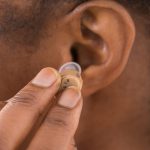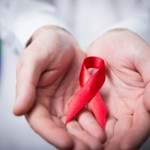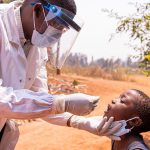Pre-exposure prophylaxis (PrEP) medicine is highly effective in preventing people from contracting HIV, and the risk of developing a drug-resistant version of the virus while on PrEP is far lower than the risk of getting HIV without PrEP, a University of Pittsburgh School of Medicine infectious diseases scientist told reporters at the International AIDS Society annual meeting.
The findings were made in a massive initiative called the Global Evaluation of Microbicide Sensitivity project, or “GEMS,” which followed PrEP rollout programs in several African countries involving more than 104,000 people taking the preventive medicine.
“For people at risk, it is important to take PrEP every day as prescribed, to stay free of HIV,” said Dr. Urvi Parikh, associate professor of medicine in Pitt’s Division of Infectious Diseases (pictured above, lower left). “And testing for HIV while on PrEP will reduce the risk of developing drug-resistant HIV if infection does occur. Our GEMS study demonstrated that it is feasible to couple drug-resistance testing with PrEP rollout programs, even in resource-limited countries and regions.”
GEMS was conducted as part of national PrEP rollout programs in Zimbabwe, Kenya and Eswatini, and through PrEP demonstration projects in South Africa. It was a coordinated effort with the ministries of health in those countries and PrEP implementation partners, and was funded by the U.S. Agency for International Development (USAID) and the U.S. President’s Emergency Plan for AIDS Relief (PEPFAR).
Of the estimated 104,000 PrEP users, there were 229 reports of HIV infection on PrEP between December 2017 and June 2021. Most were in women under age 25, and with people who were on PrEP for more than three months before becoming HIV positive. Resistance results were available for 118 HIV positive people.
About half of those infected had drug-resistant HIV, and a fifth were related to the PrEP drugs.
“That is a very small number, and when we took a closer look at those individuals whose HIV was resistant to the PrEP drugs, we could see that they had levels of the drugs in their blood suggesting they were taking them at least four times per week,” explained Parikh, who is also co-director of GEMS. “What that indicates is that they weren’t taking the medication often enough to prevent them from getting HIV, but they were taking it enough that resistant virus could emerge.”
The potential problem with resistance is that the medications used for PrEP are also used for HIV treatments that keep patients from developing advanced HIV infection and AIDS.
Parikh noted there are ways to treat drug-resistant HIV and that the drug combinations available for treatment appear effective against the resistant virus that can emerge in a small subset of PrEP users.
“That’s why it is important for PrEP users to know their HIV status through regular testing, and to stop PrEP medication if they test positive to prevent emergence of drug resistance,” said Dr. John Mellors, chief of the Division of Infectious Diseases at Pitt’s School of Medicine and co-author of the study. “Population-level monitoring for PrEP-related drug resistance can also help health care providers optimize the supply chain of appropriate medications for PrEP and antiretroviral therapy.”
“This is why studies like GEMS are so valuable,” Parikh said. “They keep us a step ahead of HIV and save lives through better prevention and treatment.”









